如何避开高考单项选择中的陷阱[下学期]
图片预览


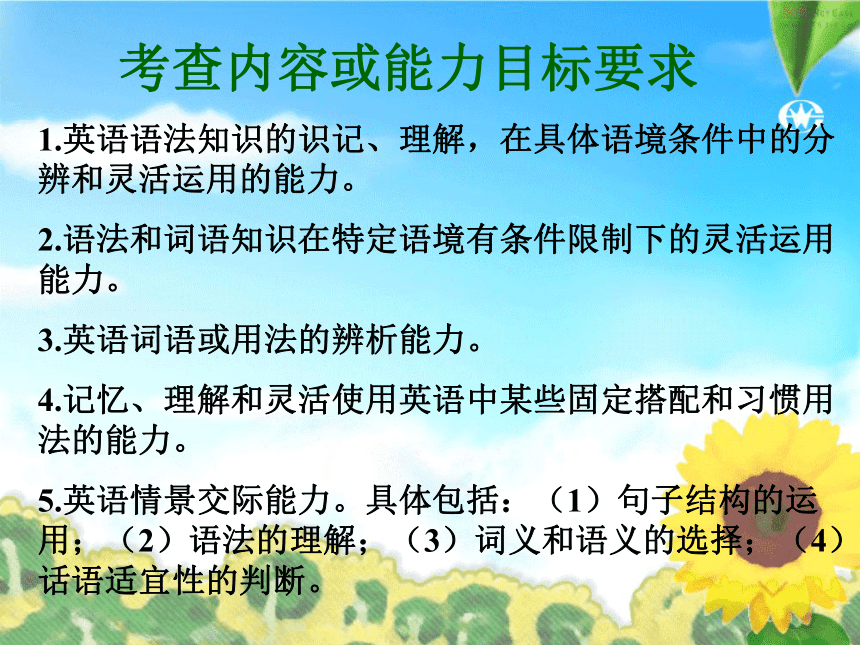

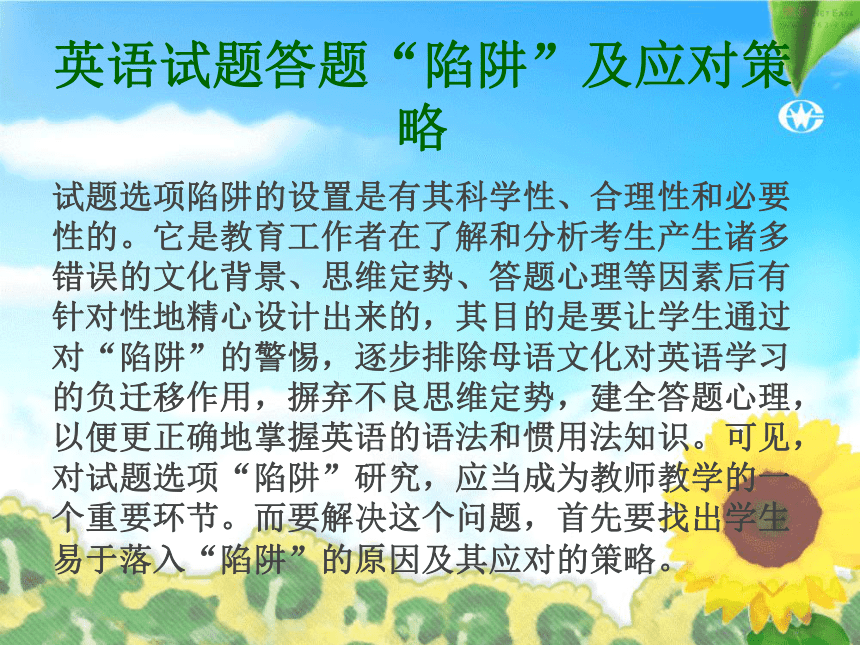

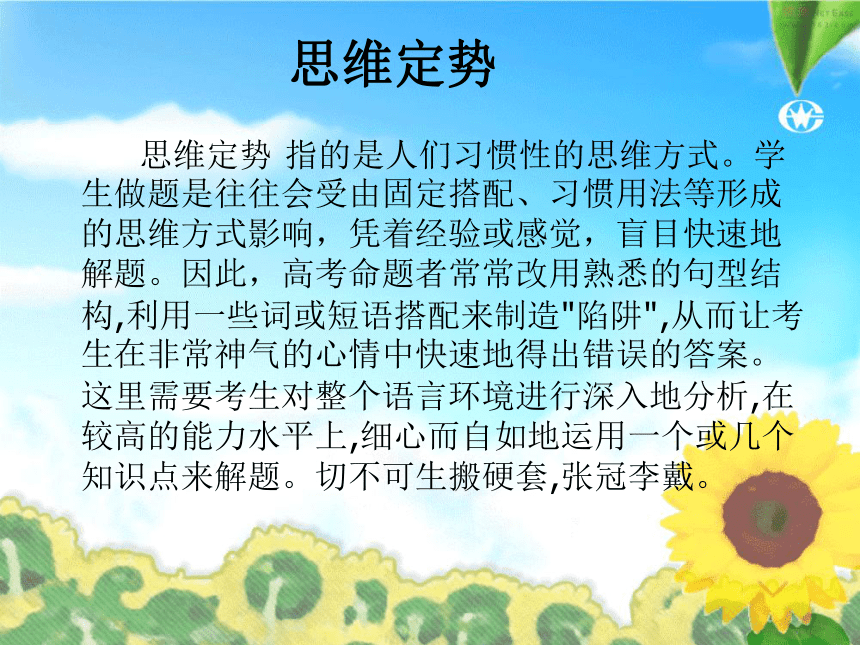
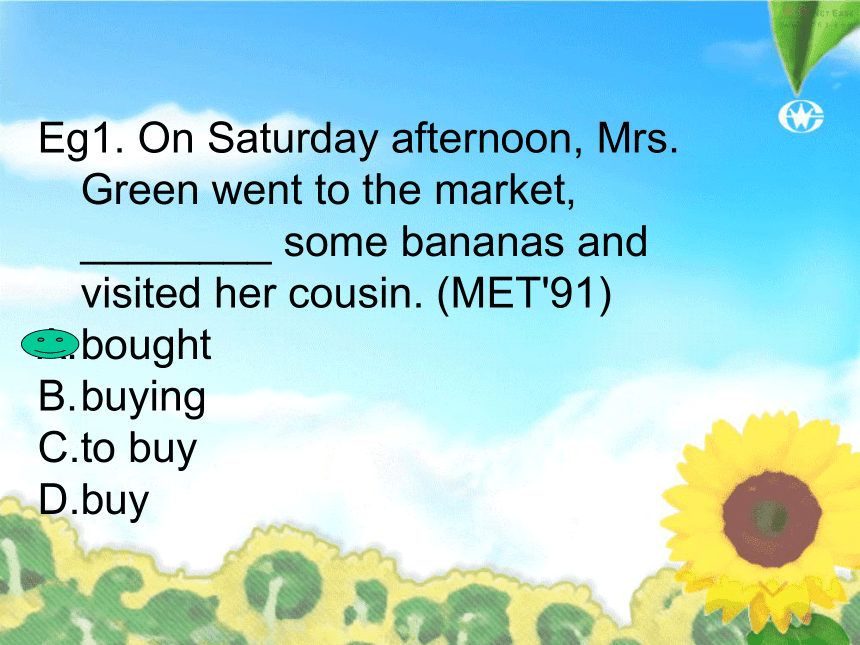
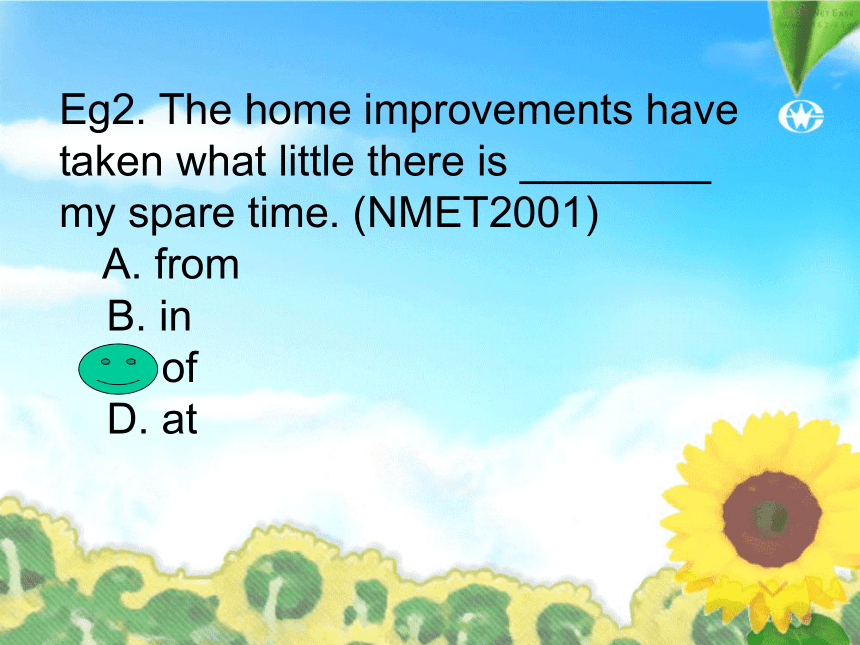
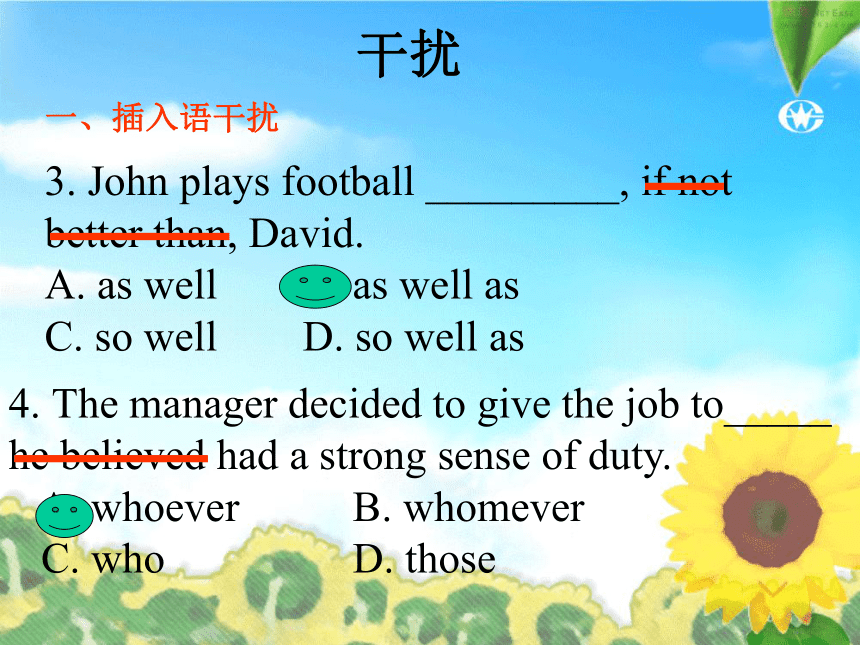
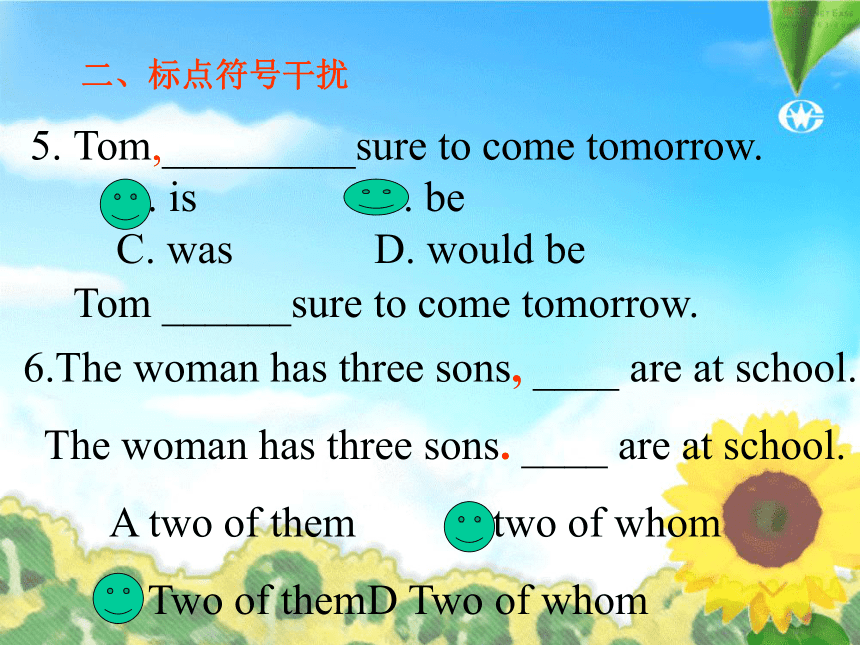
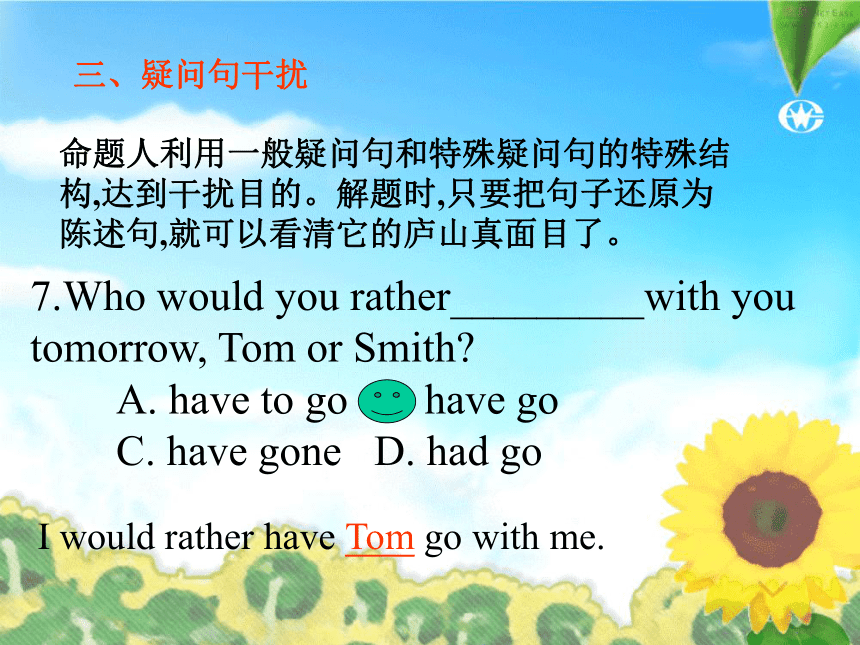
文档简介
课件39张PPT。如何避开高考单项选择中的陷阱 Lucy Cui
Ningbo CiHu Middle School命题特点 NMET单项填空题旨在考查学生对语法、词汇和交际功能项目的掌握情况。该题型所考查的内容覆盖面广,考查形式灵活。近年来,NMET试题明显加强了语言交际功能的内容,突出考查学生的语言运用能力,即在一定语境中运用语言知识的能力。
考查内容或能力目标要求 1.英语语法知识的识记、理解,在具体语境条件中的分辨和灵活运用的能力。
2.语法和词语知识在特定语境有条件限制下的灵活运用能力。
3.英语词语或用法的辨析能力。
4.记忆、理解和灵活使用英语中某些固定搭配和习惯用法的能力。
5.英语情景交际能力。具体包括:(1)句子结构的运用;(2)语法的理解;(3)词义和语义的选择;(4)话语适宜性的判断。
考查热点分析和预测 英语试题答题“陷阱”及应对策略试题选项陷阱的设置是有其科学性、合理性和必要性的。它是教育工作者在了解和分析考生产生诸多错误的文化背景、思维定势、答题心理等因素后有针对性地精心设计出来的,其目的是要让学生通过对“陷阱”的警惕,逐步排除母语文化对英语学习的负迁移作用,摒弃不良思维定势,建全答题心理,以便更正确地掌握英语的语法和惯用法知识。可见,对试题选项“陷阱”研究,应当成为教师教学的一个重要环节。而要解决这个问题,首先要找出学生易于落入“陷阱”的原因及其应对的策略。
第一、出题者利用学生的思维定势, 用英语的习惯用语、固定搭配来转移学生的注意力,模糊学生视线、干扰学生的判断力。 思维定势 思维定势 指的是人们习惯性的思维方式。学生做题是往往会受由固定搭配、习惯用法等形成的思维方式影响,凭着经验或感觉,盲目快速地解题。因此,高考命题者常常改用熟悉的句型结构,利用一些词或短语搭配来制造"陷阱",从而让考生在非常神气的心情中快速地得出错误的答案。这里需要考生对整个语言环境进行深入地分析,在较高的能力水平上,细心而自如地运用一个或几个知识点来解题。切不可生搬硬套,张冠李戴。
干扰一、插入语干扰3. John plays football _________, if not better than, David. A. as well B. as well as
C. so well D. so well as 4. The manager decided to give the job to_____ he believed had a strong sense of duty. A. whoever B. whomever
C. who D. those 二、标点符号干扰5. Tom,_________sure to come tomorrow. A. is B. be
C. was D. would be Tom ______sure to come tomorrow.6.The woman has three sons, ____ are at school.
The woman has three sons. ____ are at school.
A two of them B two of whom
C Two of them D Two of whom命题人利用一般疑问句和特殊疑问句的特殊结构,达到干扰目的。解题时,只要把句子还原为陈述句,就可以看清它的庐山真面目了。三、疑问句干扰7.Who would you rather_________with you tomorrow, Tom or Smith? A. have to go B. have go
C. have gone D. had go I would rather have Tom go with me.四、倒装句干扰8.On the grass_________two sheep. A. lies B. lie
C. lying D. laid Two sheep lie on the grass.五、从句和先行词分离干扰 同位语和定语从句一般情况下是紧跟在先行词之后,但有时为了句子平衡的需要,先行词和从句分开,从而造成了干扰。9.The question came up at the meeting _________ we had enough money for our research. A. that B. which
C. whether D. if 六、省略句干扰10.The girl is very shy, and never speaks until_________to. A. spoken B. speaking
C. speak D. be spoken The girl is very shy, and never speaks until (she is) spoken to.七、被动句干扰 11. Every minute is made full use of_________at our lessons. A. to work B. working
C. having worked D. being worked We should make full use of every minute to work at our lessons.八、搭配干扰 有时,出题人故意造成是某种固定搭配的假象,似是而非,极易上当。 12. This is the very room_________I slept in that evening. A. that B. which C. where D. at which 13. The country life he was used to_____greatly since the opening policy. A. change B. has changed
C. changing D. having changed 九、定语从句干扰 14. The young student did all that he could __________the examinations. A. pass B. to pass C. passing D. passed 15. Mrs. Brown was much disappointed to see the washing machine she had had________went wrong again. A. it B. it repaired
C. repaired D. to be repaired 十、非正常语序干扰 16. The home improvements have taken what little there is_________my spare time. A. from B. in C. of D. at The home improvements have taken what little of my spare time (there is).十一、强调句干扰 17. It is the protection for the trees______really matters, rather than how many trees are planted. A. what B. that C. / D. which 十二、词性变化干扰 18.I’m looking forward to ________ you.
A hear from B hearing from-ly adv. happily, quickly, carefully, luckily
adj. friendly, weekly, brotherly,lovely-y adj. windy, suuny, cloudy
n. difficulty, honestyPay attention to; stick to; object to十三、多义词干扰 试比较下列两个例句: 19. He is a strange character,_________is very hard to get along with. A. who B. which C. that D. where
20. He has a strange character,_________makes him difficult to get along with. A. who B. which C. that D. where 第二,受母语负迁移作用的影响,用汉语思维影响其判断的准确性。—How long can I??????? the book?
—Two weeks.
A.borrow
B.keep?
C.lend
D.renew
----Oh, I forgot to bring my umbrella.
----_______. Mine is big enough for two.
A Go ahead B Go back
C Come over D Come in第三,利用相似知识设置试题陷阱,造成学生的误解。Do you know if he??????? to the park this Sunday if it??????? ?
A.will go;is fine
B.goes;will be fine
C.will go;is going to be fine
D.goes;is going to be fine
应对策略1.指导学生对具体问题作具体分析
掌握不能死记硬背,生搬硬套基本句型和惯用法,而应从试题的具体语境出发,仔细分析基本成分和结构。
2.教导学生学会用英语的方式进行思维
汉语意思仅仅供我们参考,不能把每个题目都翻译成中文后再进行中文式的判断。在平常的练习中,应引导学生走入英语的情景中,在情景中按英语的习惯,用英语的方式思维,注意词与词的搭配,成分与成分之间的关系。3.教导学生学会瞻前顾后,要有一盘棋的思想
要求学生认真审题,仔细分析题干,冷静思考选项,找准该题的知识考点,通过权衡比较,正确作出选择。
解单项填空有十项策略技巧1)正面抉择适用于正确答案比较明朗的单项填空题。表述“对……的态度”英文是 attitude(s) to/towards...,据此可正面抉择出答案为C。returnreturn Meeting my uncle after all these years was an unforgettable moment,____ I will??always treasure.(2002全国) A.that B.one C.it?? D.what 2)反向排除适用于正确答案不易确定的单项填空题。观察题干,可知逗号后是一个含定语从句的短语,与an unforgettable moment 相并列,对moment 作进一步补充说明。one指代moment作同位语,解释一个永远珍惜的时刻。I will always treasure是定语从句,作one的定语,省略了关系代词which或that。故本题应选B。 return The other day,my brother drove his car down the street at?___?????I thought was a dangerous speed.(2004上海春季) A. as??????B. which????????C. what????D. that
。
3)正反并举(即正面选择与反向排除相结合)适用于多数单项填空题。观察题干,可知空白处应填一个既含先行词又含引导词的选项,C项what置于此题空白可表the speed that意,而其余三个选项都只是引导词,而不含先行词,应该排除。从正反两方面考虑,答案为Creturn4)消元简化适用于题干较长、附加成分(如宾语、插入语、从句)较多、题干主线不明的单项填空题。There is a new problem involved in the popularity of private cars?____?road conditions need?____?.(2003上海)
A.that;to be improved B.which;to be improved C.where;improving D.when;improving return Generally speaking,______?according to the directions,the drug has no side?effect.(2003上海) A.when taking B.when taken
C.when to take D.when to be taken
5)还原再现适用于题干或选项中有省略成份的单项填空题。【技巧运用】题干主语是drug,故应选含被动意义选项,B项=when it is taken,置于空白,题干主线是:When it is taken,the drug has no side?effect.这一表达是正确的,故可确定答案为B。 return — Sorry,Joe,I didn’t mean to... — Don’t call me “Joe”.I’m Mr Parker to you,and?____?you forget it!(2003全国) A.do B.didn’t C.did D.don’t
6)语境定义适用于情景题和交际题,解题时必须依据题干具体情景或交际对话场合、内容确定符合情理、场景的最佳答案。【技巧运用】乙方话的末尾是感叹号,而不是问号,因而表达的是一种强烈的要求,体现一种情感,而不是提出一个问题,故A、B、C都不可选。“Don’t you do...!”是一种出现主语的否定祈使句型,因而正确答案为D。 return ????第一步明确what little=that/the little(那点儿);第二步明确there is= I have;第三步明确what little there is??????my spare time=that little??????my spare time(that) I have.经过以上三步思考之后,不难看出该题应选C。
7)分步到位法适用于题干比较复杂或语序比较凌乱的单项填空题。The home improvements have taken what little there is?______?my spare time.(2001全国) ????A.from????B.in????C.of????D.at return?第一空只可填an,先排除A、B两项;从事某种职业,一般在职业名词前有一不定冠词,故可排除D而确定该题应选C。
8)选点突破适应于有两空的单项填空题,两空中,供选项的八处只有一处适合时,即可定此处所在是正确答案。若某空只能在两个选项中找到答案,则将此两项另一置于题干另一空,最终确定正确答案。 I earn 10 dollars___hour as?__supermarket cashier on Sundays.(2003上海) ?A.a,an????B.the,a????C.an,a????D.an,the???? return此题如果依据reason for(……的原因/理由),或依据explanation for(对……的解释)便选择A或D,则恰恰落入命题者设置的陷阱。乙方的话中有while you are on duty(当你值班时),这是对甲方外出抽烟行为作出严肃批评的依据,故应说There’s no excuse for this(此举/对此不可原谅)。故正确答案是B。9)克服思维定势是指解题时不要简单地从常规思维出发,或局限于想当然的偏面认识,而必须多向思维,全面思考,去伪存真,求得正确答案。—??I’m sorry I stepped outside for a smoke.I was very tired. — There’s no??_____??for this while you are on duty.(2003北京) ??A.reason B.excuse??C.cause D.explanationreturn 从语法角度考虑,便会选C,而此题依据英语口语用法应选D。在英语对话中,答语省去谓语时,或跟动词原形连用时,常用宾格代词代替主格代词。例如:— Who’s driving?(谁开车? ) — Me.(我)/Me fly?I want him to do it.(要我飞?我让他飞飞看。)
10)依据习惯用法是指解题要从英美人习惯、习俗、口语、俚语、习惯用法、习惯说法等出发确定单项填空的最佳答案,而不是从语法定义分析确定答案。— Susan,go and join your sister cleaning the yard. —????Why?____??John is sitting there doing nothing.(2003全国) A.him B.he C.I D.me return1。注意语境
2。注意句子结构的分析。
3。注意习惯用语。
4。仔细考虑,保持清醒头脑。Thank you!Bye-bye!
Ningbo CiHu Middle School命题特点 NMET单项填空题旨在考查学生对语法、词汇和交际功能项目的掌握情况。该题型所考查的内容覆盖面广,考查形式灵活。近年来,NMET试题明显加强了语言交际功能的内容,突出考查学生的语言运用能力,即在一定语境中运用语言知识的能力。
考查内容或能力目标要求 1.英语语法知识的识记、理解,在具体语境条件中的分辨和灵活运用的能力。
2.语法和词语知识在特定语境有条件限制下的灵活运用能力。
3.英语词语或用法的辨析能力。
4.记忆、理解和灵活使用英语中某些固定搭配和习惯用法的能力。
5.英语情景交际能力。具体包括:(1)句子结构的运用;(2)语法的理解;(3)词义和语义的选择;(4)话语适宜性的判断。
考查热点分析和预测 英语试题答题“陷阱”及应对策略试题选项陷阱的设置是有其科学性、合理性和必要性的。它是教育工作者在了解和分析考生产生诸多错误的文化背景、思维定势、答题心理等因素后有针对性地精心设计出来的,其目的是要让学生通过对“陷阱”的警惕,逐步排除母语文化对英语学习的负迁移作用,摒弃不良思维定势,建全答题心理,以便更正确地掌握英语的语法和惯用法知识。可见,对试题选项“陷阱”研究,应当成为教师教学的一个重要环节。而要解决这个问题,首先要找出学生易于落入“陷阱”的原因及其应对的策略。
第一、出题者利用学生的思维定势, 用英语的习惯用语、固定搭配来转移学生的注意力,模糊学生视线、干扰学生的判断力。 思维定势 思维定势 指的是人们习惯性的思维方式。学生做题是往往会受由固定搭配、习惯用法等形成的思维方式影响,凭着经验或感觉,盲目快速地解题。因此,高考命题者常常改用熟悉的句型结构,利用一些词或短语搭配来制造"陷阱",从而让考生在非常神气的心情中快速地得出错误的答案。这里需要考生对整个语言环境进行深入地分析,在较高的能力水平上,细心而自如地运用一个或几个知识点来解题。切不可生搬硬套,张冠李戴。
干扰一、插入语干扰3. John plays football _________, if not better than, David. A. as well B. as well as
C. so well D. so well as 4. The manager decided to give the job to_____ he believed had a strong sense of duty. A. whoever B. whomever
C. who D. those 二、标点符号干扰5. Tom,_________sure to come tomorrow. A. is B. be
C. was D. would be Tom ______sure to come tomorrow.6.The woman has three sons, ____ are at school.
The woman has three sons. ____ are at school.
A two of them B two of whom
C Two of them D Two of whom命题人利用一般疑问句和特殊疑问句的特殊结构,达到干扰目的。解题时,只要把句子还原为陈述句,就可以看清它的庐山真面目了。三、疑问句干扰7.Who would you rather_________with you tomorrow, Tom or Smith? A. have to go B. have go
C. have gone D. had go I would rather have Tom go with me.四、倒装句干扰8.On the grass_________two sheep. A. lies B. lie
C. lying D. laid Two sheep lie on the grass.五、从句和先行词分离干扰 同位语和定语从句一般情况下是紧跟在先行词之后,但有时为了句子平衡的需要,先行词和从句分开,从而造成了干扰。9.The question came up at the meeting _________ we had enough money for our research. A. that B. which
C. whether D. if 六、省略句干扰10.The girl is very shy, and never speaks until_________to. A. spoken B. speaking
C. speak D. be spoken The girl is very shy, and never speaks until (she is) spoken to.七、被动句干扰 11. Every minute is made full use of_________at our lessons. A. to work B. working
C. having worked D. being worked We should make full use of every minute to work at our lessons.八、搭配干扰 有时,出题人故意造成是某种固定搭配的假象,似是而非,极易上当。 12. This is the very room_________I slept in that evening. A. that B. which C. where D. at which 13. The country life he was used to_____greatly since the opening policy. A. change B. has changed
C. changing D. having changed 九、定语从句干扰 14. The young student did all that he could __________the examinations. A. pass B. to pass C. passing D. passed 15. Mrs. Brown was much disappointed to see the washing machine she had had________went wrong again. A. it B. it repaired
C. repaired D. to be repaired 十、非正常语序干扰 16. The home improvements have taken what little there is_________my spare time. A. from B. in C. of D. at The home improvements have taken what little of my spare time (there is).十一、强调句干扰 17. It is the protection for the trees______really matters, rather than how many trees are planted. A. what B. that C. / D. which 十二、词性变化干扰 18.I’m looking forward to ________ you.
A hear from B hearing from-ly adv. happily, quickly, carefully, luckily
adj. friendly, weekly, brotherly,lovely-y adj. windy, suuny, cloudy
n. difficulty, honestyPay attention to; stick to; object to十三、多义词干扰 试比较下列两个例句: 19. He is a strange character,_________is very hard to get along with. A. who B. which C. that D. where
20. He has a strange character,_________makes him difficult to get along with. A. who B. which C. that D. where 第二,受母语负迁移作用的影响,用汉语思维影响其判断的准确性。—How long can I??????? the book?
—Two weeks.
A.borrow
B.keep?
C.lend
D.renew
----Oh, I forgot to bring my umbrella.
----_______. Mine is big enough for two.
A Go ahead B Go back
C Come over D Come in第三,利用相似知识设置试题陷阱,造成学生的误解。Do you know if he??????? to the park this Sunday if it??????? ?
A.will go;is fine
B.goes;will be fine
C.will go;is going to be fine
D.goes;is going to be fine
应对策略1.指导学生对具体问题作具体分析
掌握不能死记硬背,生搬硬套基本句型和惯用法,而应从试题的具体语境出发,仔细分析基本成分和结构。
2.教导学生学会用英语的方式进行思维
汉语意思仅仅供我们参考,不能把每个题目都翻译成中文后再进行中文式的判断。在平常的练习中,应引导学生走入英语的情景中,在情景中按英语的习惯,用英语的方式思维,注意词与词的搭配,成分与成分之间的关系。3.教导学生学会瞻前顾后,要有一盘棋的思想
要求学生认真审题,仔细分析题干,冷静思考选项,找准该题的知识考点,通过权衡比较,正确作出选择。
解单项填空有十项策略技巧1)正面抉择适用于正确答案比较明朗的单项填空题。表述“对……的态度”英文是 attitude(s) to/towards...,据此可正面抉择出答案为C。returnreturn Meeting my uncle after all these years was an unforgettable moment,____ I will??always treasure.(2002全国) A.that B.one C.it?? D.what 2)反向排除适用于正确答案不易确定的单项填空题。观察题干,可知逗号后是一个含定语从句的短语,与an unforgettable moment 相并列,对moment 作进一步补充说明。one指代moment作同位语,解释一个永远珍惜的时刻。I will always treasure是定语从句,作one的定语,省略了关系代词which或that。故本题应选B。 return The other day,my brother drove his car down the street at?___?????I thought was a dangerous speed.(2004上海春季) A. as??????B. which????????C. what????D. that
。
3)正反并举(即正面选择与反向排除相结合)适用于多数单项填空题。观察题干,可知空白处应填一个既含先行词又含引导词的选项,C项what置于此题空白可表the speed that意,而其余三个选项都只是引导词,而不含先行词,应该排除。从正反两方面考虑,答案为Creturn4)消元简化适用于题干较长、附加成分(如宾语、插入语、从句)较多、题干主线不明的单项填空题。There is a new problem involved in the popularity of private cars?____?road conditions need?____?.(2003上海)
A.that;to be improved B.which;to be improved C.where;improving D.when;improving return Generally speaking,______?according to the directions,the drug has no side?effect.(2003上海) A.when taking B.when taken
C.when to take D.when to be taken
5)还原再现适用于题干或选项中有省略成份的单项填空题。【技巧运用】题干主语是drug,故应选含被动意义选项,B项=when it is taken,置于空白,题干主线是:When it is taken,the drug has no side?effect.这一表达是正确的,故可确定答案为B。 return — Sorry,Joe,I didn’t mean to... — Don’t call me “Joe”.I’m Mr Parker to you,and?____?you forget it!(2003全国) A.do B.didn’t C.did D.don’t
6)语境定义适用于情景题和交际题,解题时必须依据题干具体情景或交际对话场合、内容确定符合情理、场景的最佳答案。【技巧运用】乙方话的末尾是感叹号,而不是问号,因而表达的是一种强烈的要求,体现一种情感,而不是提出一个问题,故A、B、C都不可选。“Don’t you do...!”是一种出现主语的否定祈使句型,因而正确答案为D。 return ????第一步明确what little=that/the little(那点儿);第二步明确there is= I have;第三步明确what little there is??????my spare time=that little??????my spare time(that) I have.经过以上三步思考之后,不难看出该题应选C。
7)分步到位法适用于题干比较复杂或语序比较凌乱的单项填空题。The home improvements have taken what little there is?______?my spare time.(2001全国) ????A.from????B.in????C.of????D.at return?第一空只可填an,先排除A、B两项;从事某种职业,一般在职业名词前有一不定冠词,故可排除D而确定该题应选C。
8)选点突破适应于有两空的单项填空题,两空中,供选项的八处只有一处适合时,即可定此处所在是正确答案。若某空只能在两个选项中找到答案,则将此两项另一置于题干另一空,最终确定正确答案。 I earn 10 dollars___hour as?__supermarket cashier on Sundays.(2003上海) ?A.a,an????B.the,a????C.an,a????D.an,the???? return此题如果依据reason for(……的原因/理由),或依据explanation for(对……的解释)便选择A或D,则恰恰落入命题者设置的陷阱。乙方的话中有while you are on duty(当你值班时),这是对甲方外出抽烟行为作出严肃批评的依据,故应说There’s no excuse for this(此举/对此不可原谅)。故正确答案是B。9)克服思维定势是指解题时不要简单地从常规思维出发,或局限于想当然的偏面认识,而必须多向思维,全面思考,去伪存真,求得正确答案。—??I’m sorry I stepped outside for a smoke.I was very tired. — There’s no??_____??for this while you are on duty.(2003北京) ??A.reason B.excuse??C.cause D.explanationreturn 从语法角度考虑,便会选C,而此题依据英语口语用法应选D。在英语对话中,答语省去谓语时,或跟动词原形连用时,常用宾格代词代替主格代词。例如:— Who’s driving?(谁开车? ) — Me.(我)/Me fly?I want him to do it.(要我飞?我让他飞飞看。)
10)依据习惯用法是指解题要从英美人习惯、习俗、口语、俚语、习惯用法、习惯说法等出发确定单项填空的最佳答案,而不是从语法定义分析确定答案。— Susan,go and join your sister cleaning the yard. —????Why?____??John is sitting there doing nothing.(2003全国) A.him B.he C.I D.me return1。注意语境
2。注意句子结构的分析。
3。注意习惯用语。
4。仔细考虑,保持清醒头脑。Thank you!Bye-bye!
